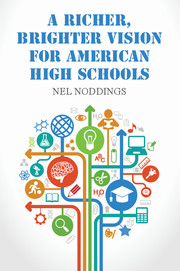Book contents
- Frontmatter
- Contents
- Introduction
- 1 Unity of Purpose
- 2 Vocational Programs
- 3 What Might Have Been: Women's Traditional Interests
- 4 A Better Adult: Continuing the Search
- 5 Parenting
- 6 The Common Core Standards
- 7 Critical Thinking
- 8 Collegiality, Caring, and Continuity
- 9 The Curriculum and Its Setting
- 10 Planning, Enacting, Evaluating
- 11 The Professional Preparation of Teachers
- 12 Reflecting on the Brighter Vision
- Notes
- Bibliography
- Index
10 - Planning, Enacting, Evaluating
Published online by Cambridge University Press: 05 June 2015
- Frontmatter
- Contents
- Introduction
- 1 Unity of Purpose
- 2 Vocational Programs
- 3 What Might Have Been: Women's Traditional Interests
- 4 A Better Adult: Continuing the Search
- 5 Parenting
- 6 The Common Core Standards
- 7 Critical Thinking
- 8 Collegiality, Caring, and Continuity
- 9 The Curriculum and Its Setting
- 10 Planning, Enacting, Evaluating
- 11 The Professional Preparation of Teachers
- 12 Reflecting on the Brighter Vision
- Notes
- Bibliography
- Index
Summary
Given the emphasis so far on a unitary purpose, collegiality, continuity, and broadly selected themes that reflect concern for connections to real life, how might individual teachers plan their courses? How should they select content, decide on pedagogical methods, and evaluate the performance of their students? How should they evaluate their own performance? We will start this chapter with an exploration of planning, then move to carrying out our plans in the classroom, and conclude with a critical look at evaluation.
PLANNING
Planning is part of the ideal aspect of teaching. For me, it has always been a special pleasure because it presents an opportunity to review and extend my own knowledge and to reformulate it more articulately. Everything is possible at the first delightful stage of planning – all the material that is prescribed, all the material I know beyond what is prescribed, all the new things I would like to learn before facing my classes. My own preference is to overplan, that is, to include in my initial plan far more than I will eventually accomplish because such planning prepares me; it facilitates spontaneity and invites student participation and choice.
All public school teachers are required to maintain a plan book in which daily lessons are briefly described in case the teacher is absent and a substitute is required. These notes are not really plans; they merely direct a substitute teacher to a page in the text, a homework assignment, or a suggestion for student activity that will fill the class period. Clearly, I am not talking here about that sort of planning. Real planning does more to prepare the teacher than the lesson. Well prepared teachers can invite student questions and engage in invitational lessons – lessons shaped in large part by the problems and interests of students. Teachers who have limited knowledge of their subject are likely to be restricted to a tightly organized plan from which they will not deviate. Unfortunately, it is exactly this sort of planning that is widely advocated today.
- Type
- Chapter
- Information
- A Richer, Brighter Vision for American High Schools , pp. 143 - 157Publisher: Cambridge University PressPrint publication year: 2015



